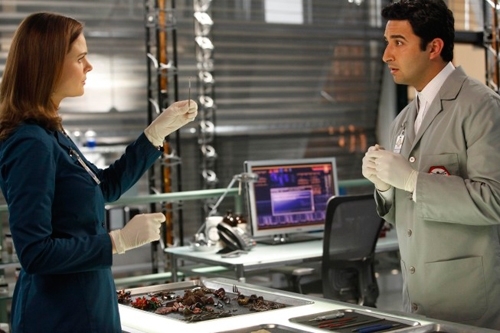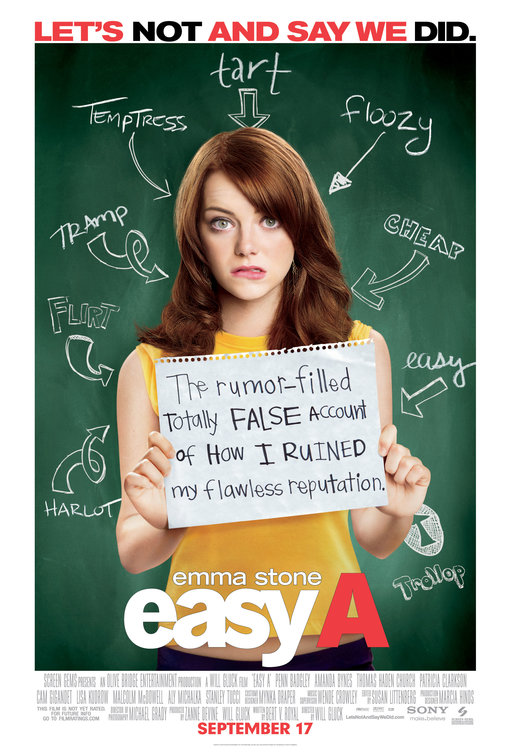I just watched the movie Easy A. I have mixed feelings about the movie as a whole. Half of me loves the sass, the humor, and the independence. The other half wonders about the morality, the rationale, and the parenting (some of which is awesome and the rest of which is…less so).
But aside from the particular pros and cons of this movie, there was one particular thing that really bugged stood out to me—something that is merely a reiteration, recycled from a host of previous movies, TV shows, and books. Here we have, yet again, the seemingly archetypal “Heinous Bitch Christian” (technically, if we want to include literature, this should probably be the “Heinous Bastard Christian” since it could be either male or female). This is a stock character which is becoming, I’m very sorry to say, ever more ubiquitous in our culture. It’s an evolution, I think, of the original “Heinous Bitch” in general. You then got the “Heinous Bitch ‘A’ Student/Do-Gooder” from that, and now, apparently, we’ve moved to the HBC.
What exactly is an HBC you ask? Really? You have to ask? Ok, well, basically it is any overtly Christian character. ever. Um…let’s see…there’s Mandy Moore’s character in Saved. There’s Sarah Jessica Parker in The Family Stone. There’s any religious character in any Chris Crutcher book ever written (oh, you don’t know who that is? Only one of my favorite YA authors of life). And then, of course, there is Amanda Bynes in last night’s Easy A. Basically, this is the character that is incredibly vocal about his or her status as one of God’s Elect, and makes it his or her mission in life to judge, condemn, and persecute all the rest of the vile sinners in the world. They are close-minded; they are stubborn; they are usually nonsensical and hypocritical; they are vindictive and persistent and utterly incapable of compromise or common sense.
Now, I’m not naïve, I know that HBC exists as a stereotype because those people exist in real life. I know that they are every bit as painful as they sound. I even appreciate their comedic or dramatic value in a story. I understand the value of depicting this sort of person both for pure dramatic effect (they function as such a very handy foil for the plucky heroine to exhibit her sass and independent thought) and for didactic value as well. I read Staying Fat for Sarah Byrnes some time in Jr. High I believe, and the character of Mark Brittain caused me to take a very honest look at myself. I realized that, though I didn’t ever want to be a person like Mark, without realizing it, I had developed some similar traits. Reading Brittain’s character allowed me to correct myself.
That being said, however, I feel a very strong need to speak out against the sheer universality of this perception. Yes, those people do exist. But they are not the only ones out there. Nor, I am willing to argue, are they even the majority (ok, maybe that is an optimistic statement, but I’m going to make it). Think about it. Christians are a group just like any and every other—comprised of a vast variety of people, each distinct and individual from the rest. Yet somehow, it has become acceptable in today’s media to pigeonhole this entire (extremely large) demographic into an incredibly insulting caricature of itself. Imagine, for a moment, that we did that with any other demographic. Imagine if every Mexican you ever saw in a movie was ignorant. What if every homosexual was a moral degenerate? What if every black was a criminal? Every Jew a penny-pinching cheat? All Muslims terrorists?
Just writing those sentences made me uncomfortable, and for good reason. While one person may possess any given assortment of faults and virtues, it is patently ridiculous to assign those same faults and virtues in the exact same proportions as a blanket across a group of people linked loosely by two or three arbitrarily selected points of correlation. People are infinitely varied and unpredictable. When, truly, has a stereotype really ever explained an entire demographic? When has it ever been an effective predictor of behavior?
Ah, you say, we can see your point as far as ethnicity or sexual orientation goes. But how can you claim that a religion is a loose correlation? Religion is a framework of beliefs, which consequently, act as a determiner of behavior. Thus, a large group of people who share a religion would, logically, share behavior. Therefore it is perfectly justifiable to condemn Christianity as a whole based on the fraction of their population who act out stupidly. As one Christian is, so must they all be.
There are two answers to this argument, the logical and the theological. In theory perhaps, yes, every member of a single religion should each behave exactly the same. In any given set of circumstances any given Jew, Muslim, or Christian should react the exact same as any other given Jew, Christian, or Muslim. Of course, the moment you make a statement like that you see how practically ridiculous it is. No two people are precisely the same. None of them have had the same experiences, think the same way, or are seeking the same things from life. And those are just differences of individuals, to say nothing of differences between sects, branches, or types (though Baptists, Catholics, and Mormons each qualify as “Christians”, it is silly to imagine that the effects of each on their members are identical…the same for Shiites and Sunnis, or Orthodox, Conservative, and Reform Jews). Suffice it to say, while at first glance it may appear as though religion ought to be a highly unifying predictor of behavior, clearly it is not.
And as for those people who use Christianity as a reason to act out stupidly? I would argue that these people have no idea what Christianity really is, let alone represent it as a whole. In its deepest, most fundamental core, Christianity is a religion of love. Christ commanded his followers to serve others and to love one another, even them that despitefully use you. The people that you see in these movies and books have no understanding of this concept. They are filled with hate, not love. And that hypocrisy is not overlooked. How often is this Christian character caught between their judgments of others and their own failure to live up to their own ideals? Indeed, hypocrisy seems to be the reigning characteristic of the HBC. A character who condemns everyone around him or her and then fails spectacularly in exactly the same things.
Why does the Heinous Bitch Christian exist? Or rather, why is it the only sort of Christian to exist in the popular media? Why is it so impossible to create a character who is striving to truly live up to the ideals of Christianity? A character who loves and respects those around him? A character who understands that no one, including herself, is perfect. A character who tries to serve others. A character who is all of those things, and Christian. Why does this character not exist? Why is society quiescent as a vast slice of its population is repeatedly maligned and accused of bigotry, hatred, idiocy, and hypocrisy over and over and over again? Why are Christians exempt from the same demands of respect that every other demographic is so justly accorded? Yes, the Heinous Bitch Christian does exist, and will, sadly, always have a place in modern story telling. But the true Christian exists as well. And he deserves to have his story told as well. She deserves a place in society. They shouldn’t be ignored and judged unfairly simply because they don’t make a scene about it.
So I make a request. Don’t perpetuate the stereotype. Make some movies where the ignorant douche bag is unaffiliated with any religion at all. Just once, try to write a devout Christian character who is not a jerk. Just give Christianity the respect to recognize that it contains all kinds of people, both good and bad, just like any other large group. Please.
 |
| This is Arastoo Viziri, a character from Fox's "Bones". He represents the only intelligent conservative religious character I think I've ever seen on TV. Way to go Bones! |





